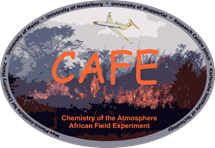
Mission status: Completed
Prof. Dr. Jos Lelieveld, Max-Planck-Institut für Chemie, Hahn-Meitner-Weg 1, 55128 Mainz, Germany
Dr. Marcel Dorf, Max-Planck-Institut für Chemie, Hahn-Meitner-Weg 1, 55128 Mainz, Germany
June 18 – September 14, 2018
| Mission phase | Dates |
|---|---|
| Preparation, payload integration, EMI testing | 18 Jun 2018 - 3 Aug 2018 |
| Mission execution | 6 Aug 2018 - 7 Sep 2018 |
| Dismounting of payload | 10 Sep 2018 - 14 Sep 2018 |
The main objective of CAFE is to study the influence of the massive biomass burning emissions from southern Africa on the atmospheric oxidation capacity over the tropical and South Atlantic Ocean. Primary objectives of the mission are to study:
Additionally several secondary objectives, building on the result from the African Monsoon Multidisciplinary Analysis (AMMA) project, will be addressed:
In order to address these objectives the scientific payload will include a multitude of stateof- the-art in-situ and remote sensing instruments for the measurements of trace gases including radicals (OH, HO2, ROx), nitrogen oxides (NO, HONO, HNO3, PAN, NOy), volatile organic compounds (VOCs), partially oxidized volatile organic compounds (OVOCs, e.g., aldehydes, ketones and peroxides), reactive tracers (SO2, CO, CH4), ozone, aerosols and their composition.
The expanse of the Atlantic Ocean, the large vertical extent of the tropical troposphere and the influence of the deep convection associated with the WAM require that this study is performed with HALO, since no other aircraft in Germany is able to fulfill the mission requirements with respect to altitude and range.
The mission will take place over the equatorial and south Atlantic (20 °N – 20 °S) during a four-week period in summer 2018. The operational base will be Cape Verde, with secondary bases (for fuel stops) at and near the African continent. Besides transfer flights to the operational base, 10-12 scientific flights (100 flight hours) are planned on task.
| Scientific Instrument Acronym | Description (Species Measured) | Principal Investigator | Institution |
|---|---|---|---|
| HORUS | OH/HO2/NO2 | Hartwig Harder | MPIC |
| PTR-MS ToF | OVOC | Jonathan Williams | MPIC |
| CCN | CCN-Counter, SP2 for soot, Aerosol impactor | Ulrich Pöschl | MPIC |
| SR | Actinic Flux | Birger Bohn | FZ Jülich |
| FAIRO | Fast ozone measurement | Andreas Zahn | KIT |
| MGC | NMVOC | Jonathan Williams | MPIC |
| TRIHOP | Total Peroxides, H2O2 / CO, HCHO, CO2 | Horst Fischer | MPIC |
| CLD | NO, NO2 | Horst Fischer | MPIC |
| CIMS | PAN, PAA | John Crowley | MPIC |
| AMETYST | Aerosol number and size distribution | MPIC | |
| C-ToF-AMS | Aerosol composition | J. Schneider / S. Borrmann | MPIC |
| ALABAMA | Single particle composition (incl. refractory material) | J. Schneider / S. Borrmann | MPIC |
| MIRAH | VOC + isotopes | Ralf Koppmann | Univ. Wuppertal |
| miniDOAS | Differential Optical Absorption Spectroscopy | Klaus Pfeilsticker | Univ. Heidelberg |
| BAHAMAS | HALO basic data acquisition system | Andreas Giez | DLR-FX |